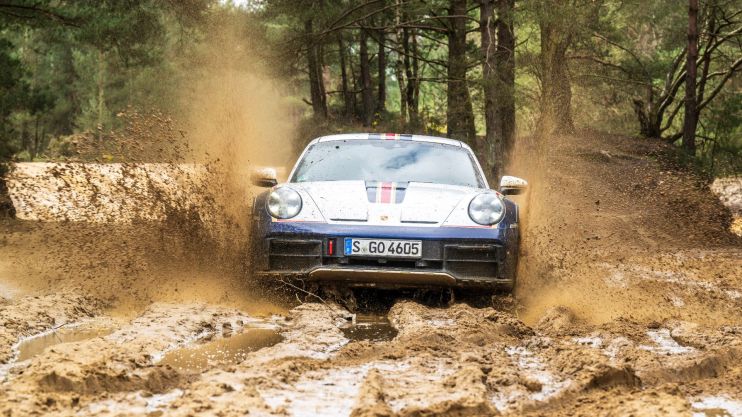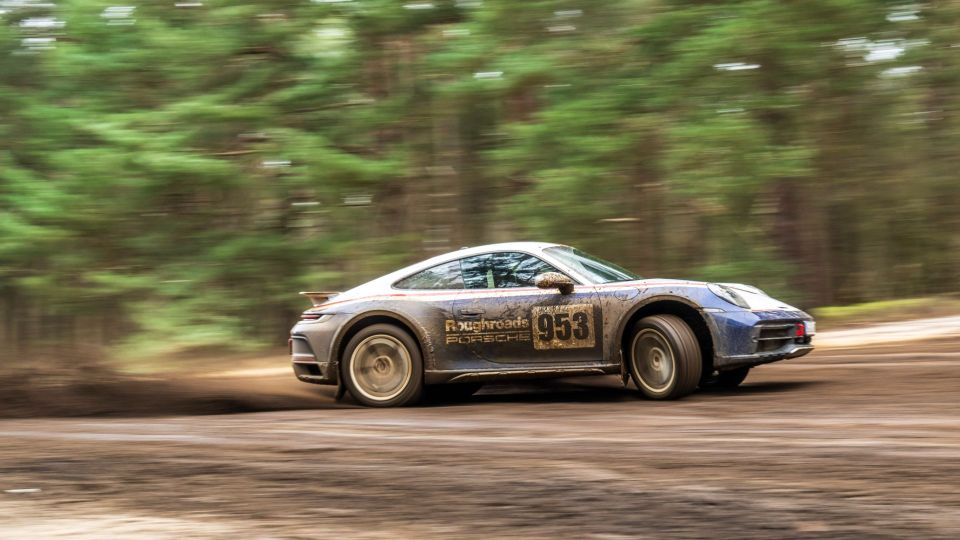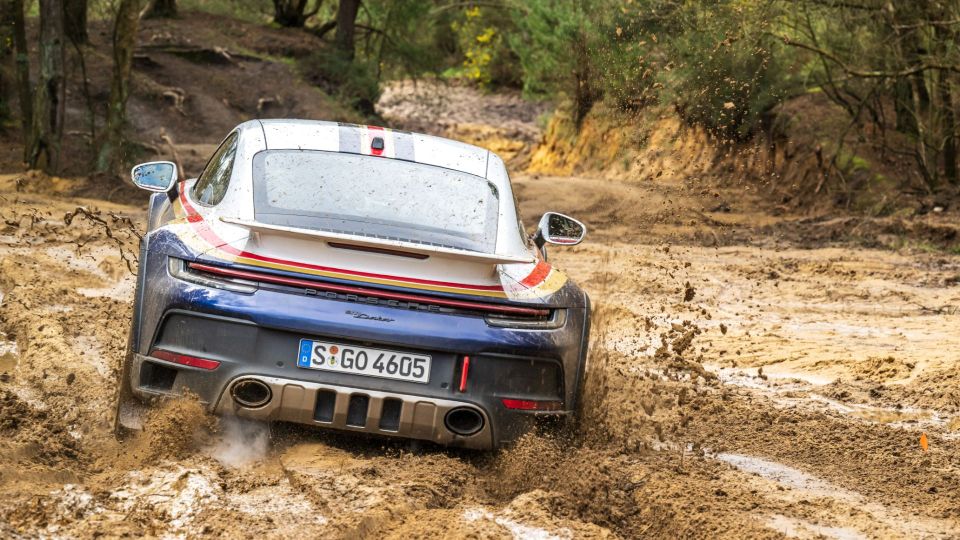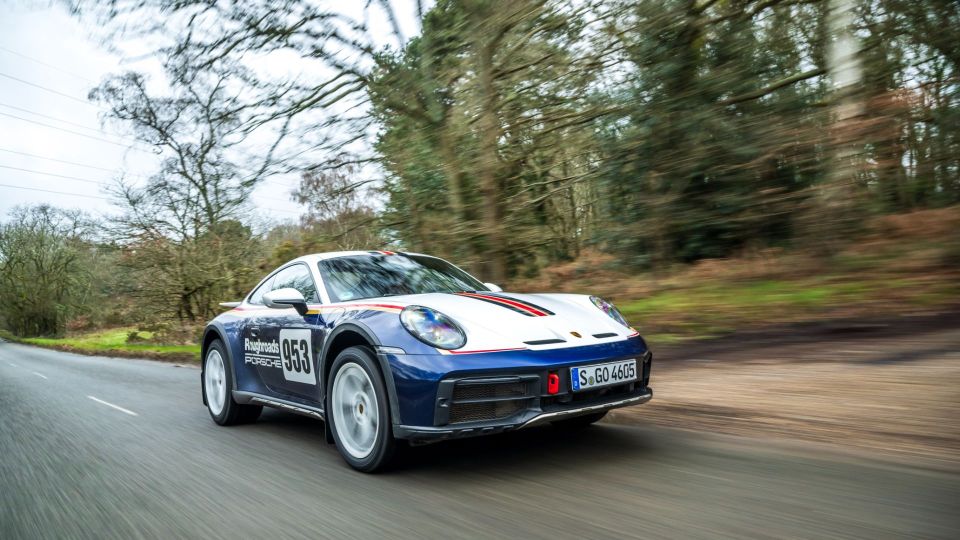Porsche 911 Dakar review: the world’s greatest sports car goes rogue

A sports car with the stance of an SUV. An off-piste explorer equipped for the urban jungle. A tribute to Porsche’s rallying heritage that doesn’t take itself too seriously. The slowest 911 since 1983 and arguably the most fun to drive. The new Dakar is chock-full of contradictions, alright.
Thanks to endless spy shots of prototype 911s with rather too much ride height, the Dakar has been motoring’s worst-kept secret for a while now. Its working title was the 911 Safari, until Tata – the Indian conglomerate that owns Jaguar Land Rover – pointed out it sells an SUV of the same name.
So, Dakar it is, inspired by the world’s most gruelling off-road rally, where Mark Thatcher went missing for six days in 1982 and Porsche took victory in 1984.
Ready for rough roads

The ‘Roughroads’ livery on this press car is a none-too-subtle nod to the Rothmans-sponsored 953 that won Weissach’s first Dakar. Part-painted, rather than just a sticker set, it’s an £18,434 option – and one that 75 percent of buyers have chosen so far.
Dealers can also sell you a roof tent, spotlights, fuel canisters, a Porsche-branded folding spade and much more. A ‘lifestyle’ 911 ready-made for Instagram likes? Perhaps, but closer inspection suggests the Dakar has earned its stripes.
Behind the back axle is a 480hp 3.0-litre engine from the 911 Carrera GTS, which drives all four wheels via a dual-clutch DSG gearbox. There the similarities end, however. The Dakar’s suspension is 50mm higher than stock, with an extra 30mm of lift available at speeds up to 105mph. It wears bespoke Pirelli Scorpion all-terrain tyres, along with a lightweight GT3 bonnet, thinner glass, plenty of underbody protection and prominent red tow hooks. I may be needing those later.
Inside, each 911 Dakar has a numbered plaque, marking it out as one of 2,500 cars worldwide. Ten percent of that total will come to the UK, and a few are still left – if you’re quick and have £173,000 to spare. Carbon fibre bucket seats are standard, but the hydraulic pump for the axle-lift means you can’t have rear seats (my car had the Rallye Sport Package, which fills the space with a roll cage). I twist the ignition toggle and the flat-six fires with a brusque bark. Time to hit the road.
Old-school cool

Yes, the road, because while the Dakar can boldly go where no 911 has gone before, I’ll wager most will rarely venture into the uncharted wilderness beyond Google Street View. I’m heading to an army proving ground, where the Porsche will tackle terrain used to test military vehicles, yet here, on the tightly coiled lanes of rural Hampshire, is the test that matters most.
I’ll admit to being a bit cynical about the Dakar, but on the road it simply makes sense. It rides with real finesse, gliding over potholes where a lower-slung GTS would jostle and jolt. The steering is weighty and accurate, and PDCC adaptive dampers keep body-roll under control. It isn’t outrageously fast – 0-62mph in 3.4 seconds and a tyre-limited top speed of 149mph – but the numbers seem less important here.
Indeed, rather than being laser-focused like the GT3 RS or Turbo S you could buy for similar money, the Dakar feels more akin to a classic 911. You sense it move around and breathe with the road, instead of coming into conflict with it. Even the knobbly tyres add to the experience, making the car more playful even at sensible speeds. Elsewhere, the traits that set this 911 apart – loftier suspension, body armour, kerb-resistant tyres – make it well-suited to city life.
Breadth of ability

If and when you arrive at the rough stuff, the Dakar offers two new drive modes: Rallye (which replaces Sport Plus) and Offroad. The former is fairly rear-biased, allowing you to drift around on loose sand like a hooligan, while the latter elevates the car to full height for steady, sure-footed progress.
Ploughing through knee-deep muddy ruts and wading through water holes feels incongruous – even slightly absurd – in a 911, but you can’t fail to be impressed by the Dakar’s sheer breadth of ability. And no, I didn’t get stuck.
Against the odds, and despite its inherent contradictions, the Dakar has emerged, as my favourite 911 in the current range. Granted, it’s expensive, but who’d bet against a limited edition Porsche holding its value in the longer term? It simply covers so many bases, from rewarding everyday road car to rugged weekend plaything. And apart from anything else, the 911 Dakar is just cool.
Tim Pitt writes for Motoring Research
PRICE: £173,000
POWER: 480hp
0-62MPH: 3.4sec
TOP SPEED: 149mph
FUEL ECONOMY: 25.0mpg
CO2 EMISSIONS: 256g/km